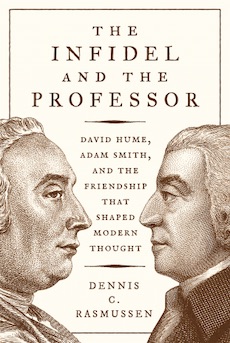Shortlisted for the 2018 Ralph Waldo Emerson Award
By Louis J. Kern
Rasmussen offers the reader a unique perspective on the intellectual and personal friendship of the most prominent philosophers of the Scottish Enlightenment, whose works challenged conventional political, moral, and religious ideas. Indeed, he maintains that “there is arguably no higher example of a philosophical friendship in the entire Western tradition.”
This is not a traditional biography since details about these men are scant and the documentary evidence of their association comprises a slim epistolary record. Both men were intensely private and instructed their executors to destroy their papers, though suppression was less complete in Hume’s case. As the elder, Hume had published all his works but the final volumes of his History of England before Smith published his first; Hume, therefore, influenced Smith, rather than vice versa.
Nor is this volume a philosophical critique or an in-depth study of ideas. Those matters are dealt with in Rasmussen’s previous book The Pragmatic Enlightenment: Recovering the Liberalism of Hume, Smith, Montesquieu, and Voltaire (2014). This volume illustrates key arguments from that volume regarding the role of sociability and sentiment as opposed to rational individualism in a sensitive narrativere of the intertwined lives of two philosophic friends.
Hume’s philosophy, typically characterized as pragmatic, empiricist, rational, and utilitarian, was in fact more subtly nuanced and radical than commonly recognized. His primary interests lay in epistemology, ethics, and political economy. Arguing that the relation of cause and effect mistook the consequential concurrence of two factors for the determination of one by the other was a rational fallacy, he extended this argument to rebut the popular theist argument from design and the validity of miracles. Morals, he asserted, had no basis in religion, but virtues were actions that were useful or agreeable either to the individual or to others. Nevertheless, he believed that religious tenets reinforced natural virtue, and he supported the established church.
Hume’s political theory, neither Whig nor Tory, rejected both the mechanistic organicism of Hobbes and Mandeville and the corporative social contract of Locke and Rousseau. He rejected the notion of the natural rights of property and argued that political power and obligation were artificial rather than natural. Consequently, he maintained that religious fanatics had played a prominent role in creating civil liberties and insisted on the necessity for a strong monarchy. Economically, he opposed the dominant bullionist mercantilist policy, staunchly supporting free trade.
His most radical “law” asserted the disjuncture between observation, reason, and moral qualities (“is” and “ought”), leaving no support, religious or empirical, for an authoritative ethics. Even more troubling, he maintained that we inferred effects from causes not by rational thought but by custom operating through the senses, a mechanical kind of instinct that we shared with animals.
Smith shared many of Hume’s ideas but was no mere epigone; he revised and softened the hard edges of Hume’s provocations without substantially altering their substance. As a consequence, he was more conventionally successful. He published only two books to eleven by Hume, but his were immediately successful. Whereas Hume was denied university positions at both Edinburgh and Glasgow, Smith enjoyed an eleven-year career as Chair of Moral Philosophy in Glasgow. Hume was widely considered a bon vivant; Smith was shyer and more retiring. Hume’s influence on international philosophical thought was enormous (he was feted as “Le Bon David” by the French); Smith was instrumental in establishing the theoretical basis for free-market capitalism.
Rasmussen provides a glimpse into the close friendship of these two men that humanizes two of the most influential thinkers of the Enlightenment—a friendship grounded in sympathy, conviviality, and intellectual debate.
Louis J. Kern (ΦBK, Clark University,1965) is professor emeritus of history at Hofstra University. Hofstra University is home to the Omega of New York chapter of Phi Beta Kappa.




